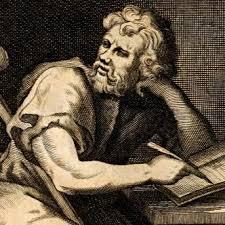
GAIUS MUSONIUS RUFUS is a Roman Stoic philosopher. He teaches in Rome during the emperorship of Nero. As a consequence, he has to endure exile in AD 65, returning afterwards to Rome under Galba. He stays in Rome when Vespasian banishes all the other philosophers from the city in AD 71. Nonetheless, he again suffers exile himself, only coming back after Vespasian’s death. A collection of extracts from his lectures still survives. He is also prominent in the history of philosophy for being the teacher of Epiktetos (Epictetus).
Gaius Musonius Rufus’ philosophy features a strong practical tendency. A philosophy not limited to words and instruction, but one that everyone could practice and pursue for himself. He believes in the power of philosophy over people’s and in its capacity to heal corruptions in human minds.
His worry is to elaborate a set of rules for everyday life, with the support of the necessary logic. He gives little attention to the physical teachings of the Stoics and thinks that the gods know everything with no need for reasoning. He also considers human souls very close to gods and strongly maintains the liberty of the rational soul (<dianoia>).
Gaius Musonius Rufus thinks that the only great obstacles along the path of moral life are prejudices and habits. He distinguishes two kinds of practice. Firstly, the exercise of the mind in reflection. Secondly, the endurance of pains which affect the soul and the body.
His suggestions for a simple life are scrupulosly in fine details. He gives careful instructions for diet, care of the body, clothing, and even furniture. He even specify that the hair could grow long. And he says that the beard is a natural element for covering the face. He banishes meat while praising food which is furnished and offered by nature.